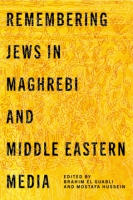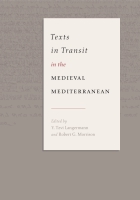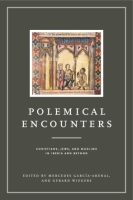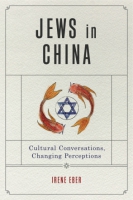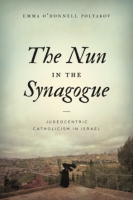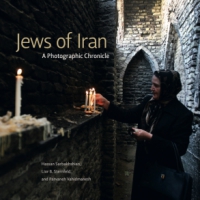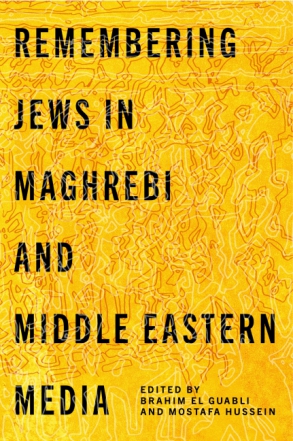
Remembering Jews in Maghrebi and Middle Eastern Media
Edited by Brahim El Guabli and Mostafa Hussein
Remembering Jews in Maghrebi and Middle Eastern Media
Edited by Brahim El Guabli and Mostafa Hussein
“For decades, the subject of indigenous Jews in Arab/Amazigh/Muslim countries has formed a taboo, entangled in the war zones of Palestine and Israel. Yet an increasingly visible body of work by artists and scholars whose background is largely Muslim has begun to unmute the public-sphere silence shrouding the absence of past Jewish neighbors. Brahim El Guabli and Mostafa Hussein’s coedited volume constitutes a landmark intervention within this growing field of inquiry. The book sheds light on the departure of Jews from their erstwhile homelands specifically in terms of its impact on their neighbors, emphasizing Muslim views of these ruptured relations. Rather than treat Jewish communities as a historically separate entity apart from Muslim societies, the editors’ compelling introduction and the refreshing essays gathered here bear witness to the depth and complexity of the relations between the two communities. Given the history of partition, the book is careful to not cast one narrative of loss, whether Palestinian or Arab-Jewish, at the expense of the other. Instead, the collection illuminates the mutual imbrication of losses, underscoring the ways in which the void left in the wake of Jewish departure can be creatively revisited, especially when the surfacing of past stories animates an intergenerational transmission of cultural memory. Envisioning a terrain of alternative possibilities, El Guabli and Hussein’s Remembering Jews in Maghrebi and Middle Eastern Media transcends the academic boundaries separating the fields of Middle Eastern/Arab/Amazigh studies, on the one hand, and Jewish studies, on the other, providing a generative framework for a much-needed scholarly engagement.”
- Description
- Reviews
- Bio
- Table of Contents
- Sample Chapters
- Subjects
Read as a whole, the collection affords an uncommon opportunity to mourn and heal through a nuanced reckoning with the absence of Jews from communities in which they had lived for millennia. Its wide geographic reach and interdisciplinary nature will speak both to scholars and lay readers in Amazigh studies, Arabic studies, Middle Eastern studies, Jewish studies, memory studies, and a host of other disciplines.
In addition to the editors, the contributors to this volume are Iskandar Ahmad Abdalla, Abdelkader Aoudjit, İlker Hepkaner, Sarah Irving, Stephanie Kraver, Lital Levy, Nadia Sabri, and Lior B. Sternfeld.
“For decades, the subject of indigenous Jews in Arab/Amazigh/Muslim countries has formed a taboo, entangled in the war zones of Palestine and Israel. Yet an increasingly visible body of work by artists and scholars whose background is largely Muslim has begun to unmute the public-sphere silence shrouding the absence of past Jewish neighbors. Brahim El Guabli and Mostafa Hussein’s coedited volume constitutes a landmark intervention within this growing field of inquiry. The book sheds light on the departure of Jews from their erstwhile homelands specifically in terms of its impact on their neighbors, emphasizing Muslim views of these ruptured relations. Rather than treat Jewish communities as a historically separate entity apart from Muslim societies, the editors’ compelling introduction and the refreshing essays gathered here bear witness to the depth and complexity of the relations between the two communities. Given the history of partition, the book is careful to not cast one narrative of loss, whether Palestinian or Arab-Jewish, at the expense of the other. Instead, the collection illuminates the mutual imbrication of losses, underscoring the ways in which the void left in the wake of Jewish departure can be creatively revisited, especially when the surfacing of past stories animates an intergenerational transmission of cultural memory. Envisioning a terrain of alternative possibilities, El Guabli and Hussein’s Remembering Jews in Maghrebi and Middle Eastern Media transcends the academic boundaries separating the fields of Middle Eastern/Arab/Amazigh studies, on the one hand, and Jewish studies, on the other, providing a generative framework for a much-needed scholarly engagement.”
Brahim El Guabli is Associate Professor of Arabic Studies and Comparative Literature at Williams College. He is the author of Moroccan Other-Archives: History and Citizenship After State Violence and coeditor of the two-volume Lamalif: A Critical Anthology of Societal Debates in Morocco During the “Years of Lead” (1966–1988).
Mostafa Hussein is Assistant Professor of Jewish-Muslim relations at the University of Michigan. His research has appeared in journals such as Israel Studies Review, Journal of Levantine Studies, and Jewish Quarterly Review.
List of Illustrations
Foreword, by Lital Levy
Acknowledgments
Introduction
1. Generative Absence: Jewish Loss as a Catalyst for Literature, Film, and Thought
Brahim El Guabli
2. On the Wrong Side of History: The Jews in Algerian Literature
Abdelkader Aoudjit
3. Literary Representations of Jews in Twenty-First Century Arabic Literature in Egypt
Mostafa Hussein
4. Al-Zaman al-Gamīl Refigured: Jews and Re-Narration of the Nation on Egyptian TV
Iskandar Ahmad Abdalla
5. Death, Burial, and Loss in Ali al-Muqri’s Al-Yahūdī al-ḥalī (The Handsome Jew)
Sarah Irving
6. Bearing Witness and Resurrecting Kurdish-Arab-Jewish Memory in Mādhā ‘an al-sayyida al-yahūdiyya rāḥīl?
Stephanie Kraver
7. Documenting and Debating Turkey’s Loss
İlker Hepkaner
8. Exile in a Contemporary Artistic Project in Morocco: Jewish Memories in Form and Concrete Territories
Nadia Sabri
9. Narrating the Homeland from Exile: Iranian Jewish Writers Writing on Their Departure, Identity, and Longing
Lior B. Sternfeld
List of Contributors
Index
Download a PDF sample chapter here: Introduction
Mailing List
Subscribe to our mailing list and be notified about new titles, journals and catalogs.
